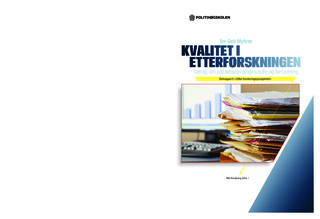| dc.description.abstract | This report is one of three from the research program «Quality of investigations» carried out at the Norwegian Police University College. The report discusses the role of the police prosecutors and responsibilities during criminal investigations. First, «quality» is defined as «an activity, which is conducted according to certain agreed standards». It is argued that the most relevant standards during investigations are: Do the police investigate the right cases? Does the investigation contain all relevant elements within the procedural term «proving the question of guilt» and thus clear up the case? Is relevant information for imposing a correct sentence obtained? Is the investigation conducted according to procedural law and standards and carried out objectively? Has the investigation been done as quickly as possible and have the aggrieved persons and the public been satisfactory informed? The last standard is listed as whether the document file is satisfactory and that seized objects are secured and stored properly. The standards have different weight in the overall assessment of investigation quality. The report argues that the most important standard is how the question of guilt is investigated, and that it is done objectively and according to procedural law. The main part of the report contains a more detailed discussion of the different standards, focusing on the role of the police prosecutors in the investigation (chapter 2). Chapter 3 outlines the legal basis for the police prosecutors’ responsibilities and leading role in the investigation. Chapter 4 discusses what we actually know about the importance of the police prosecutors’ role for the quality of the investigation. It is concluded that it is more based on common sense than scientifically proved data. The preconditions for the police prosecutors leading role in the investigation is discussed in chapter 5. The importance of having sufficient time to lead and direct, being located close to the investigators, having relevant legal knowledge and legitimacy with the investigators is discussed. Finally, results from a survey among police prosecutors on how they carry out their job are presented. The main findings are that the police prosecutors on a regular basis do take a leading, advisory and controlling role in the investigations. Their focus is on whether the investigation reveals all relevant information for deciding on the question of guilt (clear-up of the case) and for imposing a correct sentence, and also whether the investigation is conducted as speedily as possible. They have little focus on whether the investigations are done procedurally correct and objectively, even though they see this as important when asked. | nb_NO |
